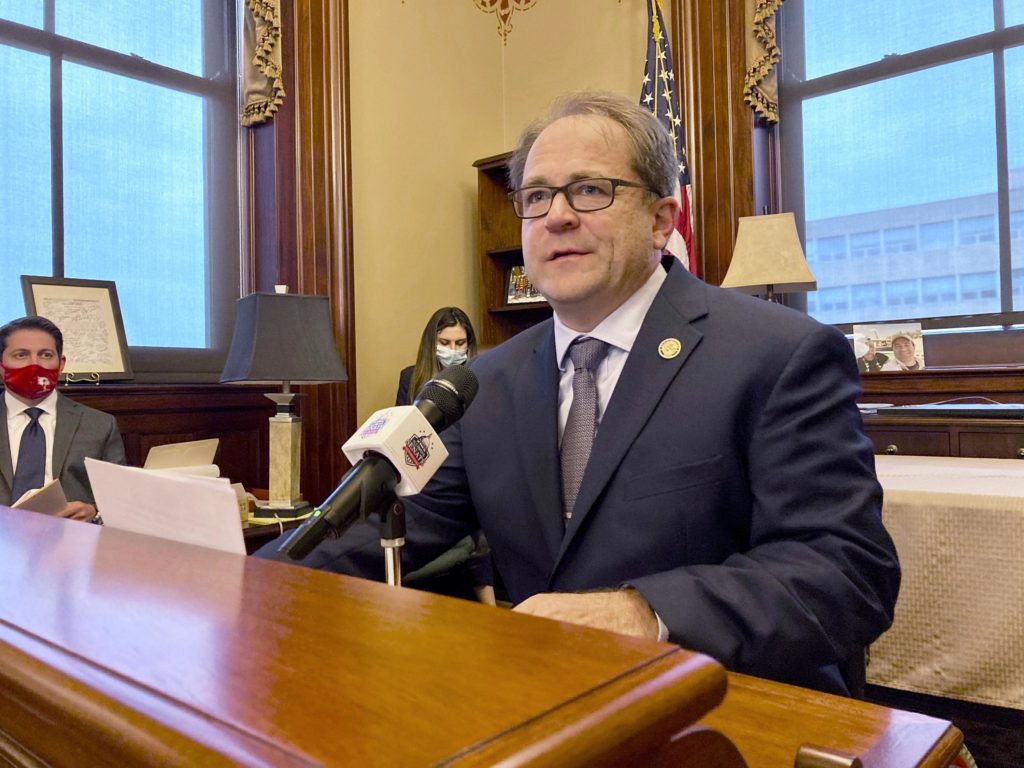
SPRINGFIELD, Ill. (AP) — Illinois Republicans pounced on Gov. J.B. Pritzker Wednesday for his seeming change of heart on how legislative districts are drawn, urging the reform-minded governor to seize an opportunity to make a dent in the state’s long-reviled history of corruption.
Senate Minority Leader Dan McConchie berated the governor for statements a day earlier in which the Democrat backed away from a 2018 campaign pledge to veto a Census-driven remap authored by legislators or political party leaders. Instead, he said that upon receiving a map drawn by Democrats who control the General Assembly, “I will be looking to it for its fairness.”
“The gerrymandering train is on the tracks,” McConchie, a Republican from Hawthorn Woods, said in his Capitol office. “Gov. Pritzker has considerable power as the chief executive to make his candidate promise a reality. If the governor abandons that promise, he abandons the best chance that we have to actually have changed the nature of our politics.”
The Senate Redistricting Committee’s ranking Republican, Sen. Jason Barickman of Bloomington, wants lawmakers to create a nonpartisan, independent commission to begin the process, an idea Pritzker claims would require a constitutional amendment which Republicans reject.
But as a candidate in 2018, Pritzker voiced support for an amendment while recommending that until then, lawmakers create an independent commission to take politics out of map-making.
Asked Wednesday for elaboration or explanation of the statement Barickman characterized as a “flip-flop,” Pritzker spokeswoman Jordan Abudayyeh would not comment further.
Smarting from Monday’s release of U.S. Census data showing Illinois losing population for the first time since at least the Industrial Revolution, the Democrats’ redistricting leaders pledged to move forward with the once-a-decade process of adjusting political district boundaries based on population shifts and the accompanying loss of another seat in Congress.
Reapportionment must abide by the federal Voting Rights Act to prevent racial discrimination. By state constitution, districts must be “compact, contiguous and substantially equal in population.” But critics contend that gerrymandering is often a byproduct of Illinois mapmaking as the party controlling the pen draws lines to maximize ballot power. It’s also a practice routinely mentioned by political reform advocates as a way to check corruption. Ethics reform is a priority for the governor.
The Constitution requires the General Assembly to create a map by June 30, a deadline which, if missed, puts the job into the hands of a legislatively appointed commission composed of a bipartisan mix of legislators and four non-lawmakers. If it can’t agree, a random draw decides on a ninth member to tip the partisan balance. That happened in each of the three remaps before 2011, when a Democratic-controlled Legislature approved a map signed into law by a Democratic governor.
Senate Democrats jeered the GOP overture. Chicago Democratic Sens. Omar Aquino and Elgie Sims, who lead that chamber’s redistricting effort, claimed in a joint statement Republicans want to eliminate input from the Legislature —- and therefore, taxpayers — stalling long enough to force consideration by the constitutional commission, “political appointees who answer to power brokers, not the people of Illinois.”
That is not what Barickman intends. Sixteen independent members chosen by the Illinois Supreme Court would comprise his commission. It would go to work this spring and the process would survive constitutional challenge, Barickman said, because the new map committee’s work would have to be approved by the commission described in the constitution — with the caveat that appointees to the latter panel agree to approve it. Furthermore, McConchie said the true map deadline is Oct. 5, when a commission-created remap must be delivered to the secretary of state.
“There’s no reason for the governor to flip-flop…,” Barickman said. “Voters… don’t trust government and the governor has an opportunity here to change that narrative.”
In a later telephone interview, Sims said requiring a politically appointed group to approve what an independent panel tabbed by the Legislature creates is counter-intuitive.
“How is that fair?” Sims asked. “We’re going to create a map that is fair, reflects the diversity of the state, and does what we want it to do, which is a map that looks like Illinois.”
By JOHN O’CONNOR for the Associated Press
